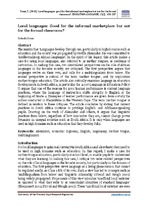| dc.contributor.author | Desai, Zubeida | |
| dc.date.accessioned | 2014-07-25T10:19:01Z | |
| dc.date.available | 2014-07-25T10:19:01Z | |
| dc.date.issued | 2013 | |
| dc.identifier.citation | Desai, Z. (2013). Local languages: good for the informal marketplace but not for the formal classroom?, Education as Change, 17 (2): 193-207 | en_US |
| dc.identifier.issn | 1682-3206 | |
| dc.identifier.uri | http://hdl.handle.net/10566/1134 | |
| dc.description.abstract | The maxim that ‘Languages develop through use, particularly in high domains such as education and the courts’ was propagated by Neville Alexander. He was committed to ‘intellectualising African languages’. In the spirit of his legacy, this article makes a case for using local languages, also referred to as mother tongues, as mediums of instruction. In making this case, two interrelated perspectives on the role of African languages in the broader society, are critiqued. The first perspective argues that languages evolve on their own, and calls for a multilingualism from below. The second perspective is critical of the term ‘mother tongue’, and by implication mother-tongue education. The article also critically examines language in education developments in South Africa, in particular the 1997 Language in Education Policy. It argues that one of the reasons for poor learner performance is current language practices, where the language of instruction shifts abruptly to English at the beginning of Grade 4. Examples of learner performance are given from a study the author conducted in Khayelitsha in the Western Cape. The term ‘mother tongue’ is defined in relation to these critiques. The article concludes by stating that current practices in South Africa continue to privilege English- and Afrikaans-speaking pupils. Drawing on the work of Alexander and others, it argues that linguistic practices from below, regardless of how innovative they are, cannot change power dynamics in unequal societies such as South Africa. It is only when languages are used in high domains such as education that they develop fully. | en_US |
| dc.language.iso | en | en_US |
| dc.publisher | Taylor & Francis | en_US |
| dc.rights | This is the authors' final draft following peer review. It may be displayed and circulated, subject to full acknowledgement of author and source. The published item is copyright Taylor & Francis. | |
| dc.source.uri | http://dx.doi.org/10.1080/16823206.2013.803659 | |
| dc.subject | Alexander | en_US |
| dc.subject | Economic diglossia | en_US |
| dc.subject | English | en_US |
| dc.subject | Hegemony | en_US |
| dc.subject | Mother tongue | en_US |
| dc.subject | Multilingualism | en_US |
| dc.title | Local languages: good for the informal marketplace but not for the formal classroom? | en_US |
| dc.type | Article | en_US |
| dc.privacy.showsubmitter | false | |
| dc.status.ispeerreviewed | true | |
| dc.description.accreditation | Web of Science | en_US |

